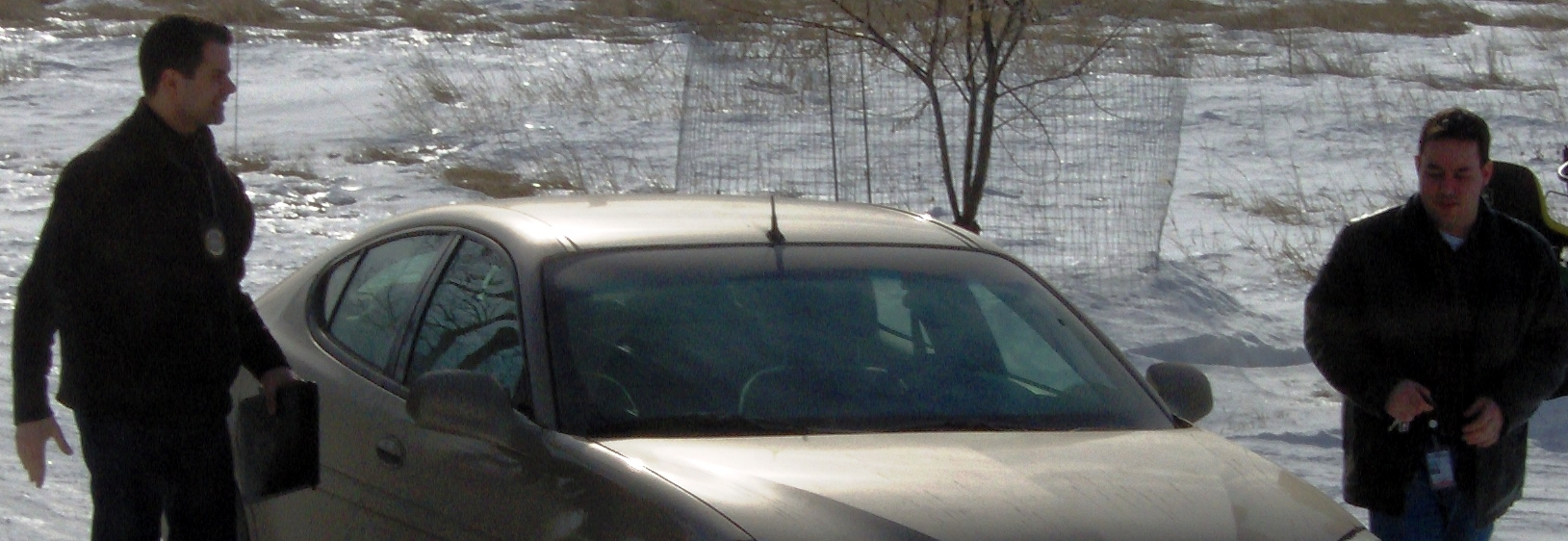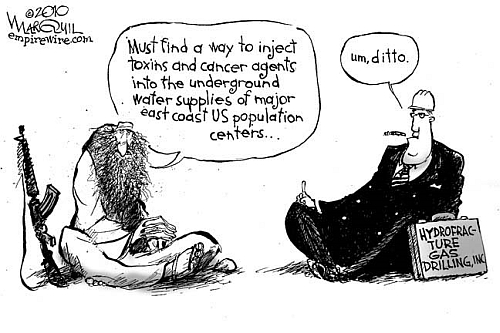Last Stop for High Profile Fracking Suit: Supreme Court, In striking Ernst appeal, Alberta court wraps blanket of immunity around regulator by Andrew Nikiforuk, September 16, 2014, TheTyee.ca
The Alberta Court of Appeal has effectively ruled that one of the nation’s most powerful regulators can violate the nation’s Charter of Rights and Freedoms by banishing citizens and falsely branding them as a security threats.
That’s exactly what happened to oil patch consultant Jessica Ernst. She is now suing the regulator, the Alberta government and Encana Corporation over the alleged contamination of her groundwater by the shallow fracking of coal seams in central Alberta nearly a decade ago.
But the Court of Appeal, which has the power to make law or correct errors in law, argues in a densely worded 11-page decision that Energy Resources Conservation Board (now the Alberta Energy Regulator) owes no duty of care to individual landowners harmed by industrial activity.
Furthermore the decision states that an immunity clause in the Energy Resources Conservation Act (Section 43) protects the powerful regulator from any lawsuit or Charter claim regardless of how the regulator has treated individual citizens.
“Provisions immunizing decision makers from liability are not so uncommon or unusual in free and democratic societies as to rend them constitutionally unreasonable,” explains the ruling.
But Cory Wanless, one of Ernst’s lawyers in the high profile case, thinks that Albertans should be duly alarmed by the decision.
“The tenor of the judgement is that the regulator knows best and because it knows best, citizens should not challenge what it does in court,” says Wanless, an Albertan and member of the famed Klippensteins law firm in Toronto.
Together with lawyer Murray Klippenstein, Wanless has worked seven years on the lawsuit.
To date none of the voluminous evidence on groundwater contamination from hydraulic fracking collected by Ernst and her lawyers has been presented in court.
“How can a provincial government grant immunity to a regulator for infringing Charter rights?” asks Wanless.
But the Court of Appeal decision, which makes no mention of the duty to protect groundwater, argued that citizens wronged by government should seek redress through other remedies such as judicial reviews or a complaint process.
But in Ernst’s case, the regulator closed that very door. It even told its employees to avoid all communication with the environmental consultant.
Democracy on trial
To Wanless the new legal ruling also raises a fundamental issue in a democracy. “If a regulator doesn’t do its job, then how do citizens fix that reality when the courts close the door to claims against the regulator?”
Seven years ago, oil patch consultant Ernst sued Alberta Environment, the Energy Resources Conservation Board (ERCB) and Encana, one of Canada’s largest unconventional gas drillers, over the contamination of her well water with hydrocarbons and the failure of government authorities to properly investigate the contamination.
The $33-million lawsuit alleges that Encana was negligent in the fracking of shallow coal seams; that the ERCB breached Ernst’s freedoms under the Charter of Rights and Freedoms, and that Alberta Environment performed a problem-plagued investigation in bad faith.
In Sept. 2013 Alberta Chief Justice Neil Wittmann, who volunteered to manage the well-known lawsuit, struck down Ernst’s Charter claim against the energy regulator as well as her negligence claim against the regulator on the basis of statutory immunity.
But at the same time Wittmann allowed claims of negligence against the government of Alberta and Encana, an aggressive pioneer in fracking and mining of unconventional hydrocarbons, to proceed.
Worldwide attention
The case, which effectively puts the practice of hydraulic fracturing as well as the legal performance of the province’s oil and gas regulators on trial, has drawn international attention.
Each day as many as 400 people from around the world read updates on hydraulic fracturing or details on the legal case on Ernst’s popular blog.
Ernst told The Tyee that she was not surprised by the decision. “The courts only reflect what Albertans vote for, and they vote for these kinds of civil abuses as long as revenue flows from hydrocarbons.”
Alberta, often described as a classic petro state, has been ruled by one party for more than 43 years.
The industry-friendly government receives a third of its revenue from the fracking of oil and gas deposits as well as the mining of bitumen. Even the province’s energy regulator is now directed by a former energy lobbyist.
As a consequence Ernst says that the energy regulator is the most guilty party in her lawsuit. She will seek leave to appeal today’s ruling to the Supreme Court of Canada.
“It’s really bad when a regulator helps a company cover up a documented case of groundwater contamination, and then they violate the Charter. This precedent just can’t be allowed.”
Ernst’s lawyers have argued in court the regulator’s statutory immunity clause “cannot provide immunity to a government from valid Charter claims. The Charter guarantees not only fundamental rights and freedoms, but crucially, also guarantees the right for Canadians to seek a remedy when these fundamental Charter rights and freedoms are violated. These constitutional rights cannot be taken away by statutory immunity in a provincial statute.”
Accused of being out to ‘humiliate’ regulators
Curiously, both Justice Wittmann and the Court of Appeal issued their rulings on the validity of Ernst’s Charter claim without hearing a shred of material evidence on the case.
The facts, many of which are a matter of public record and appear on Ernst’s website, are alarming.
In Nov. 2005 the regulator sent Ernst a letter saying it had told its staff to “avoid any further contact” with the oil patch consultant on the grounds that she had criticized the board and made “criminal threats.”
Yet in June 2006 Rick McKee, then chief counsel for the regulator, admitted in a taped interview (Liberal MLA David Swann was a witness too) that Ernst never presented a security threat to the organization.
Moreover, the real issue concerned her critical comments on the board’s performance in the wake of the controversial drilling and fracking of thousands of gas wells above the base of groundwater protection in central Alberta without so much as a cumulative impact plan or groundwater monitoring program.
During the taped interview McKee repeatedly accused Ernst of airing the board’s dirty laundry in public.
“What you are doing is, hey, I don’t want to make it sound like people are a bunch of sensitive, you know, but at the end of the day, you are, you seem to be, attempting to humiliate the organization. And if that is your intention good on you, but don’t expect us to help you,” McKee told Ernst.
“You are too intelligent and too capable to bash us,” added McKee. (The Tyee has a copy of the tape.)
But neither Wittmann nor the Court of Appeal ever heard or consulted this evidence. No doubt Ernst’s team would welcome a chance to argue to Supreme Court judges that the tape recording provides evidence the regulator banished a citizen with a contaminated well water on the basis of known falsehoods, but later admitted they were falsehoods.
Two per cent of complaints investigated
The Ernst case is explosive in other ways too.
Public records obtained by the scientist and businesswoman through the Freedom of Information Act raise serious questions about how thorough were the government’s subsequent investigation of numerous groundwater contamination cases in 2006 and 2007.
Only five of nearly 100 complaints were actually studied.
Even top scientists in the field of methane contamination such as University of Alberta scientist Karlis Muehlenbachs later characterized the investigation as “bullshit.” His separate studies showed industry contamination of water wells in many cases.
John McDougall is now the Harper appointee heading the National Research Council. In May 2007, McDougall, then the director of the Alberta Research Council, reported to Alberta cabinet ministers that ARC’s allegedly independent study was underway. He included an odd warning that might seem more suited to a public relations advisor, one that seemed to anticipate the findings that would eventually be published six months later. Citizens, McDougall wrote, “may not willingly accept the findings” that methane contamination of water wells was natural or due to bad water well practices — a standard industry claim used across North America.
But in a recent advertisement in the Calgary Herald, even the Canadian Association of Petroleum Producers now admits that many public concerns about hydraulic fracturing and water quality “are based on past operations involving coal-bed methane — shallow deposits in closer proximity to groundwater.”
The Calgary Herald reported Alex Ferguson saying that shallow fracks “did occasionally contaminate water resources.” Ferguson is CAPP vice president of policy and environment.
Ferguson added that “In some of the more infamous instances, affected landowners could light their well water on fire.”
In 2011 the Australian Petroleum Association revealed that the industry has “never shied away from the fact that there will be impacts on aquifers” from coal seam drilling.
Friends working in the oil patch told Ernst at the time that the levels of methane that foamed and erupted in her water well after Encana fracked nearby coal seams was not only dangerous but among the highest they had ever seen in the province.
Justice Wittmann is expected to make a ruling soon on whether or not the Alberta Government is also immune from legal claims for gross negligence.
Volley of gunfire directed at shale gas protester’s property fails to interest police by Dallas MacQuarrie, May 18, 2014, Halifax Media Coop
Environmental extremism a rising threat to energy sector, RCMP warns by Shawn McCarthy, September 14, 2014, The Globe and Mail
RCMP analysts have warned government and industry that environmental extremists pose a “clear and present criminal threat” to Canada’s energy sector, and are more likely to strike at critical infrastructure than religiously inspired terrorists, according to a report released under Access to Information. Written by the force’s critical infrastructure intelligence team, the 22-page RCMP document argues there is a “growing criminal phenomenon” associated with environmentalism that aims to interfere with regulatory reviews and force companies to forego development.
“Environmental ideologically motivated individuals including some who are aligned with a radical, criminal extremist ideology pose a clear and present criminal threat to Canada’s energy sector,” said the report, written in March 2011. Since then, the RCMP has held regular meetings with energy companies and federal officials….
“In reality, criminal occurrences attributed to environmentalists have and are more likely to, occur within Canada,” the report said. It added that the Canadian Security Intelligence Agency (CSIS) monitors individuals and organizations….
Carleton University criminologist Jeff Monaghan, who obtained the document, said the RCMP authors constructed a trend from isolated incidents. He worries police and other security agencies are using anti-terrorism legislation to broaden their investigation and monitoring….
RCMP spokesman Greg Cox denied the force is targeting protesters or environmental groups in general. “The RCMP does not investigate individuals, groups or movements, but will investigate the criminal activity of any individuals who threaten the safety and security of Canadians.” [Emphasis added]
[Refer also to:
February 12, 2009: The Intimidation of Ernst A segment of Ernst presentation at Cochrane, Alberta, September 10, 2011

February 12, 2009: Following a CTV W5 National News segment of Ernst’s explosively contaminated well water and the ERCB’s treatment of her, “undercover” Royal Canadian Mounted Police with the Harper government’s anti-terrorist squad arrive warrant-less at Jessica’s home in Rosebud to interrogate. EnCana, Alberta Environment and the ERCB had been served legal papers two months previously.

